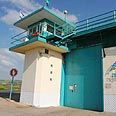
(Illustration)
Photo: Hagai Aharon
The Israel Prison Service (IPS) had granted a petition by two convicted killers, a man and a woman, and will fund their fertility treatments, Ynet learned Monday. The request was granted after a five-year legal battle by the couple.
"This is an extremely rare case in which two convicted felons will be given funding for fertility treatments and have a child together while they are both serving a life sentence," an IPS official told Ynet. "This case is the first of its kind in the IPS history."
Related stories:
The man was convicted of killing his brother and sentenced to 35 years in prison, of which he has already served 10 years. The woman was convicted of killing her former husband after he abused her. The two met while serving their sentence, and have been granted conjugal visits.
Throughout the five-year debate, the IPS stressed that there was no objection to the couple's having a baby, but rather to their demand that the Prison Service pay for the fertility treatments.
Israeli law does not bar inmates from having children, but does state that they should carry the costs of any necessary fertility treatments.
Attorney Revital Katz, for the couple, claimed that as inmates, who are not members of any of Israel's HMOs due to their incarceration, are not eligible for subsidized fertility treatments, which infringes on their right to have children. Katz claimed that since the two were under the IPS' care, the Prison Service should subsidize the treatments.
The case was heard by the Petah Tikva District Court, acting as the Administrative Court, but before the court could rule on the matter, the IPS decided to grant the petition.
"Due to the extraordinary circumstances of the case and for humane reasons, the Prison Service has decided to pay for the fertility treatments, according to the national health basket guidelines," an IPS statement said.
Should the treatments prove successful and the woman gives birth, IPS regulation will allow her to raise the child until the age of two. A Social Services committee then convenes to decide whether custody of the child should be awarded to the immediate family, or should the child be made a ward of the State.
- Receive Ynetnews updates
directly to your desktop















